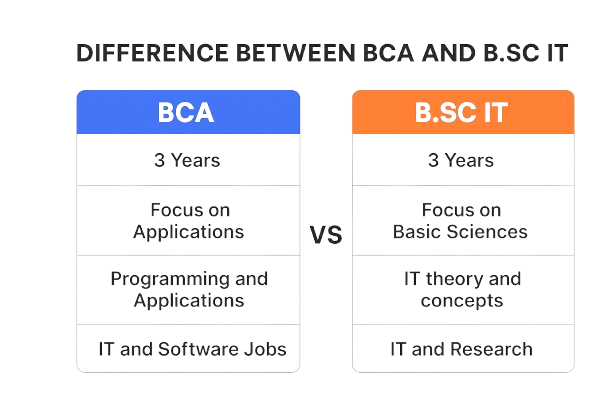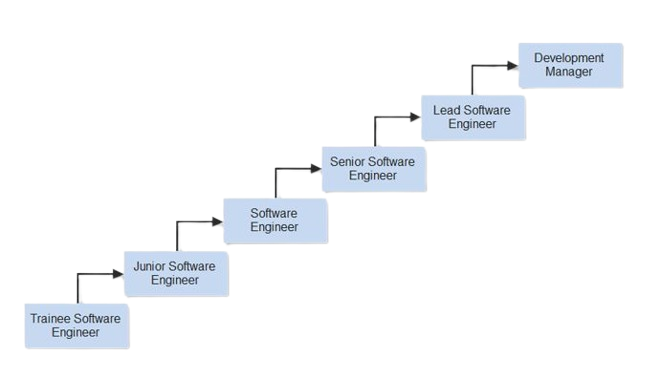" Begin your tech journey with BCA — where creativity meets coding, and students turn ideas into real-world digital solutions "

The Bachelor of Computer Applications (BCA) is a three-year undergraduate program designed to provide students with a strong foundation in computer science, software development, and information technology. The course covers programming languages, database management, networking, web development, and application design, ensuring that students develop both theoretical knowledge and practical skills. BCA is ideal for students who want to start a career in the IT sector immediately after graduation or pursue higher studies like MCA or specialized certifications. With rapid advancements in technology and the increasing demand for skilled IT professionals, BCA graduates have numerous career opportunities in software development, web and app development, data analysis, and IT consultancy. The degree equips students with problem-solving, analytical, and technical skills required to thrive in a competitive industry. It also provides flexibility to work in both private IT companies and government organizations, making it a highly valuable and versatile undergraduate program.
Why Should Students Opt for BCA After 12th?
BCA is an ideal choice for students who have completed their 12th standard and are interested in building a career in the IT and software industry. It offers a structured curriculum that introduces students to programming languages, database management, networking, and computer applications. This foundation helps students gain both theoretical knowledge and practical skills required in today’s technology-driven world. Choosing BCA after 12th ensures that students start specializing early in computer applications. Unlike general degrees, BCA focuses entirely on IT, preparing students for software development, web designing, app development, and system administration. It’s especially useful for students who aim to enter the tech industry without taking an engineering path. Additionally, BCA opens doors to professional growth. Students can pursue higher studies like MCA or certifications in programming, cloud computing, and cybersecurity. These advanced courses enhance skills and improve employability, allowing students to compete effectively in the IT job market.
The degree also develops analytical thinking, logical problem-solving, and technical proficiency. By learning programming, algorithms, and database concepts, students gain the ability to work on real-world projects and technological solutions, giving them a strong edge when applying for jobs or internships. Finally, BCA provides flexibility in career choices. Graduates can work in IT companies, software firms, government projects, startups, or even freelance in web development and digital services. This combination of knowledge, skills, and opportunities makes BCA a preferred choice after 12th.
What is the Difference Between BCA and B.Sc IT?
Although BCA and B.Sc IT both focus on technology and computing, their scope and approach differ significantly. BCA is more application-oriented, emphasizing software development, programming languages, database management, and web technologies. Students are trained to design, develop, and implement software solutions. B.Sc IT, on the other hand, is more theory-oriented and provides a deeper understanding of computer science fundamentals, including networking, operating systems, and information security. It focuses more on research and academic concepts rather than direct application development.

The career paths also vary. BCA graduates often step directly into software development, mobile app development, web design, and IT services. B.Sc IT graduates are more suited for research, data analysis, system administration, or pursuing higher academic degrees like M.Sc IT. While both degrees offer strong IT foundations, students looking for hands-on programming and development skills usually prefer BCA. Those inclined toward theoretical computer science or academic research might find B.Sc IT more suitable.
Furthermore, BCA often integrates practical projects, internships, and workshops that prepare students for industry challenges, making it a more job-ready degree compared to B.Sc IT.
How Does BCA Help in Becoming a Software Developer or Data Analyst?
BCA provides comprehensive training in programming languages such as C, C++, Java, Python, and SQL. This training equips students with the necessary skills to develop software applications, mobile apps, and websites. Programming projects and assignments during the course give hands-on experience, which is essential for a career as a software developer.
For those aiming to become data analysts, BCA teaches database management, data structures, and statistics. Students learn how to collect, analyze, and interpret data, preparing them to work with business intelligence tools, analytics software, and reporting dashboards.
The curriculum also encourages logical thinking and problem-solving, which are crucial for software development and data analytics. By working on real-world projects, students gain practical exposure to coding standards, debugging, testing, and system optimization.
Moreover, BCA includes exposure to emerging technologies like AI, machine learning, and cloud computing, which are increasingly relevant in software development and data analysis roles. This ensures that graduates are not only skilled in traditional programming but also in modern, in-demand technologies.
Finally, internships and industry-oriented workshops offered during BCA programs help students gain practical experience and networking opportunities, making the transition from student to professional smoother and more effective.
What Career Opportunities are Open After BCA?
BCA graduates have a wide range of career opportunities in the IT and software sectors. They can work as software developers, web developers, system analysts, database administrators, and network administrators. These roles are in high demand across IT companies, startups, and corporate organizations. Apart from technical roles, BCA graduates can also enter business intelligence, data analysis, and digital marketing fields. With the growth of e-commerce and online services, IT professionals with programming and analytical skills are increasingly valued in non-technical sectors as well. Higher education also expands career prospects. Graduates can pursue MCA, MBA in IT management, or specialized certification courses like cloud computing, AI, or cybersecurity. These advanced studies help in securing higher positions and better salaries. Additionally, BCA graduates have the flexibility to work as freelancers, build their own software or web development business, or provide IT consultancy services. This entrepreneurial avenue provides independence and growth potential.
Software Developer Career Roadmap

Finally, BCA graduates are eligible for government IT jobs, banking IT roles, and other public sector opportunities where technical knowledge is required. This ensures a blend of private and public sector career options.
Can BCA Graduates Work in Government and Private IT Sectors?
Yes, BCA graduates are highly sought after in both government and private IT sectors. In private companies, they can take up roles like software developer, network engineer, system analyst, web designer, and database administrator. The IT industry values BCA graduates for their technical skills, programming knowledge, and ability to adapt to evolving technologies.
Government opportunities include IT officer positions, public sector banking IT roles, and technical support jobs in various ministries and departments. Many government exams and recruitment processes also recognize BCA as a valid undergraduate degree for IT-related positions.
The versatility of BCA allows graduates to apply for jobs in diverse industries such as banking, finance, healthcare, e-commerce, education, and telecommunications. Technical expertise combined with problem-solving skills gives them a competitive advantage in both sectors. Furthermore, BCA graduates can enhance their eligibility for higher-level positions by pursuing MCA, certifications in AI, cloud computing, cybersecurity, or business analytics. This combination of qualifications strengthens career growth in both government and private sectors.

Affiliated Universities
Navigo Academy works with well-known universities around the world to bring you trusted and valuable programs. These partnerships give students the chance to learn from expert teachers, gain recognized qualifications, and use resources that make learning easier and more practical.
By studying with our affiliated universities, you also get global exposure, modern learning methods, and a supportive community that helps you grow. Our goal is to prepare you with the right knowledge and skills to succeed in your career and personal life.

Unlock Growth Through Global Learning
Kennedy University partners with Navigo Academy to offer programs that recognize achievements and encourage growth in multiple fields.

Innovate and Grow Globally
Amity University collaborates with Navigo Academy to provide innovative learning experiences that prepare students for global opportunities.

Build Skills for a Successful Future
Shoolini University works with Navigo Academy to deliver quality programs that build skills, knowledge, and confidence for future success.
